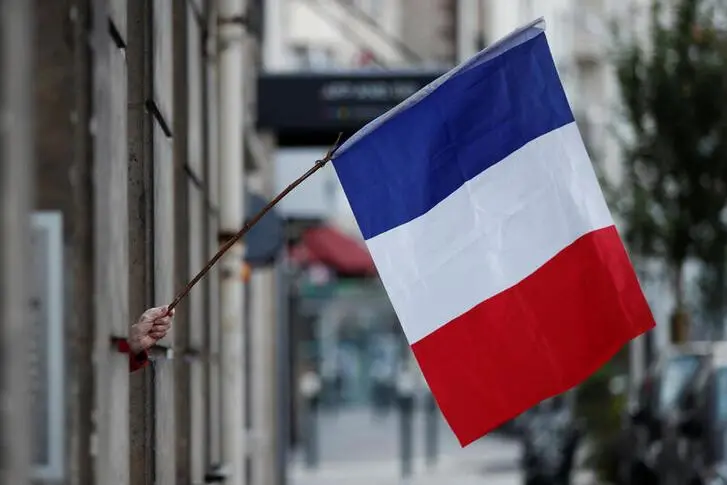PHOTO
France on Saturday assumed the presidency of the Council of the European Union, a position that rotates every six months among the EU member states.
Holding this position is a big deal. With 27 members in the EU, each country has a long wait for their turn. It is an opportunity for member states to shape the policy agenda and promote their national interests on the European stage. Countries plan for months — sometimes years —for their opportunity.
France last held the presidency in 2008. This time, its presidency comes at a difficult juncture for the bloc. The initial shock of the UK’s departure has still not fully settled down. There is a debate across much of Europe on what the EU’s future should be, but it is not accompanied by any political will to make the necessary reforms or institutional changes to address many of the EU’s shortcomings. No major treaty has been agreed on since the controversial Lisbon Treaty in 2009. The desire to add new members has stalled. France is also in the middle of a contentious presidential election campaign, with voting in April. The political power of the far right poses a real challenge to Emmanuel Macron’s re-election.
While issues of trade, economy, and institutional reform of the EU often dominate the agenda, there is an opportunity for the country holding the presidency to influence foreign policy too. Macron knows that France’s EU presidency can boost his credentials as a statesman during the election campaign. There are three areas to keep an eye on when it comes to international affairs during the French EU presidency.
The first is the idea of “strategic autonomy.” This is a fancy way of saying that the EU should not be as reliant on the US as it currently is. Many in the EU want Europe to take on the greater share of its own security without depending so much on the US. Until recently, few policymakers in Europe took this idea seriously, mainly because NATO has worked so well in the past and the US could always be counted on. However, views are starting to change.
Donald Trump’s time in the White House made many in Europe question America’s commitment to transatlantic security. Biden’s actions in Afghanistan also made America’s European partners question US resolve. Now, the debate about strategic autonomy in Europe is back on the agenda. President Macron has been a strong supporter of strategic autonomy because he would like to see France usurp America’s influence when it comes to European security issues. However, until Europeans start spending more money on defense and security issues, very few practical outcomes will lead from this pursuit of “strategic autonomy.”
The second foreign policy issue to keep an eye on is the Iran talks in Vienna. The Biden administration is desperate to revive the original 2015 agreement with Iran on its nuclear program, so much so that a new deal has become one of its main foreign policy objectives. Tehran senses this desperation and has been leading the US into thinking that it is serious about returning to compliance. In reality, no progress has been made in Vienna. The Europeans want a new deal almost as much as the Biden administration does. In particular, French companies want to do business with Iran without the fear of US economic sanctions. As a country that was involved in the original agreement, France will no doubt play a role in trying to negotiate a new one, and there is little doubt that Macron will use his platform in the EU to do so.
Finally, expect a focus on Europe’s relations with North Africa during the French presidency. For years, the French have been deeply involved in the Sahel. At Paris’s insistence, the EU has launched at least 14 EU military and security missions in Francophone Africa over the years. For France there are two issues at stake. First is the issue of migration from North Africa to southern Europe, which plays directly into domestic politics in France. Second, terrorism originating from the region keeps French policymakers up at night. Expect Paris to get the EU even more focused on the region.
Even with these three foreign policy objectives, the French presidency of the EU must be prepared for the unexpected. The last time France held the presidency in 2008, Russia invaded Georgia. President Nicolas Sarkozy ended up spending a considerable amount of his time leading Europe during this crisis. With Russia poised to strike Ukraine, and China increasing its activities around Taiwan, Paris must be ready.
Macron said recently that France’s aim during the presidency was “to move toward a Europe that is powerful in the world, fully sovereign, free in its choices and in charge of its own destiny.” However nice that sounds, he will be unable to achieve it in six short months. That said, there is no shortage of problems for the French presidency of the EU to deal with. The next several months will be interesting for Paris and for Europe.
- Luke Coffey is director of the Douglas and Sarah Allison Center for Foreign Policy at the Heritage Foundation. Twitter: @LukeDCoffey.
Copyright: Arab News © 2021 All rights reserved. Provided by SyndiGate Media Inc. (Syndigate.info).





















